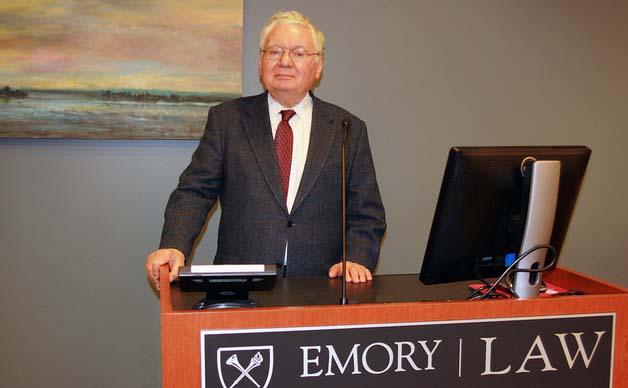Manna from heaven: Judge Buergenthal's liberation from Auschwitz and rise to human rights leader

Judge Thomas Buergenthal
“I was lucky to get into Auschwitz.”
A startling statement by Judge Thomas Buergenthal with a sad explanation. In Auschwitz, his father was able to watch and track the behaviors of the gestapo, Judge Buergenthal said. That made it easier for him to avoid Josef Mengele, the Angel of Death.
In a recent lecture to Emory Law faculty, students and staff, Buergenthal, a child survivor of the Auschwitz and Sachsenhausen concentration camps, recalled his time in Auschwitz, crediting instructions from his father and “sheer luck” for keeping him alive during his internment. Where to stand in line, when to line up – these were the things his father had figured out how to navigate. He remembers the day, however, when he was sorted into a different line than his father and was taken to a sick camp where he was housed next to the crematorium and gas chamber and could hear the screaming each night. Red cards were marked for those headed to death, and Buergenthal remembers the day that he awoke to see all of the 30-40 people he’d arrived with gone. A doctor in the camp had torn up the boy’s red card and created a new one – one that did not bear the red mark.
“I can remember being in that place and having a warm feeling come over me, where I was no longer afraid of dying. I was resigned to the fate and felt comfortable. But the fear came back, and I wanted to live again.” And he did.
The Echo of Human Cruelty
Judge Buergenthal has become a leading world authority on international law and human rights. He was judge and president of the Inter-American Court of Human Rights and judge of the International Court of Justice (ICJ), among many high honors and distinctions, including holding the position of I.T. Cohen Professor of International Law and Human Rights at Emory University School of Law from 1985 to 1989.
Throughout his career, Buergenthal has earned numerous academic and honorary degrees and has won a plethora of awards. In May of 2015, he retired to speak to audiences about human rights atrocities that are still committed across the globe still today. From Sachsenhausen to Auschwitz to El Salvador, there has been one thing consistent in human rights violations over time, Buergenthal says: “Our human cruelty against each other is never very imaginative. The serious violations, regardless of where they took place, were the same.” And so the suffering of those seeking refuge from violence in the Middle East is something with which he finds commonality, as well. “The world is reacting the same way they’ve reacted to so many things before. When I see the migrants, I see myself in the eyes of the children. This is what was happening to us.”
Which Way to Go?
And what did happen to him in that concentration camp so many years ago? Buergenthal remembers his camp being “liquidated.” He remembers the three-day death march out of Auschwitz in January 1945. He remembers being cold and barely covered. He remembers that if people tried to stop and sit, they were immediately shot. Then there was the nine-hour ride in an open vehicle. No food. Just snow. He remembers driving through part of the Czech Republic and looking up to see people yelling down to them from bridges above. He remembers bread raining down on their open vehicle and wondering if he was imagining manna from heaven. He arrived to a new camp with frostbite and had to have toes amputated. And he remembers being liberated by Soviet troops who opened a door and told them they could go any place they wanted – except toward Berlin, because there was still fighting there.
Buergenthal chose to go to America. In 1951, at age 17, he entered the country and has been here – happily, he adds – ever since.
He never forgets, though, that so many did not make it out. And he believes that something could have been done about it. “When I think back about what could have been done in Germany in the 1930s – before the Holocaust – I believe very strongly that if we had some of the institutions, the NGOs, we have now, we could have prevented it. If we had some of the international machinery in place, things might have been different. I think the institutions are very useful. We blame the UN for everything, but the UN is not responsible. It’s the states in the UN. They have the power to do good and bad.”
Despite all he has seen and experienced, Judge Buergenthal maintains a sense of optimism. Asked about the future, whether significant change will have been made in the human rights arena 20 years from now, he graciously replied, “I certainly hope so.”